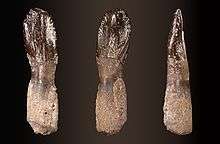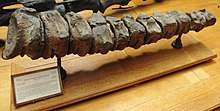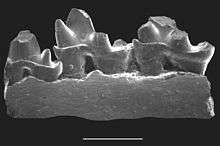Isalo III Formation
The Isalo III Formation is a geological formation in Madagascar, off the eastern coast of Africa. It dates back to the Middle Jurassic.[1] The use of the term "Isalo III" is somewhat controversial as the two prior units Isalo I and II are Triassic cross-bedded sandstone units that form a continuous depositional sequence, while the "Isalo III" sandstones are not part of the same depositional sequence, and were deposited considerably later. and are perhaps better treated as part of several separate formations.[2] It is traditionally divided into two subunits the lower, Bajocian aged Isalo IIIa unit also known as the Beronono Formation and the upper, Bathonian aged Isalo IIIb unit also known as the Sakaraha Formation or Sakahara Formation.[3] The Sakaraha Formation consists of sandstones, marls and carbonates and represents a coastal plain environment, and is laterally equivalent to the predomiantly carbonate Bemaraha Formation, which represents a coastal barrier lagoon complex.[2] The formation is found in the northwest and in the southeast of the country and has provided a variety of fossils.
| Isalo III Formation Stratigraphic range: Bajocian-Bathonian ~168–165 Ma | |
|---|---|
| Type | Geological formation |
| Sub-units | Isalo IIIa or Beronono Formation Isalo IIIb or Sakaraha Formation |
| Overlies | Isalo II Formation (unconformity) |
| Lithology | |
| Primary | Sandstone |
| Other | Claystone, marl |
| Location | |
| Coordinates | 16.6°S 47.0°E |
| Approximate paleocoordinates | 23.9°S 25.1°E |
| Region | Mahajanga & Fianarantsoa Provinces |
| Country | |
| Extent | Mahajanga Basin |
 Outcrops of the formation in Madagascar | |
Vertebrate fauna
Dinosaurs
| Dinosaurs | ||||
|---|---|---|---|---|
| Taxon | Species | Presence | Notes | Images |
| Indeterminate | Geographically located in Faritany Majunga, Madagascar.[1] | |||
| Lapparentosaurus[1] | L. madagascariensis | Geographically located in Faritany Majunga, Madagascar.[1] |
"More than [four] partial skeletons lacking skulls and teeth."[4] |
|
| Archaeodontosaurus | A. descouensi | Ambondromamy, Majunga, Madagascar | Teeth and mandible |  |
| "Bothriospondylus" [1] | "B." madagascariensis | Geographically located in Faritany Majunga, Madagascar.[1] |
"Isolated vertebrae, limb elements of at least [ten] individuals."[5] |
 |
| ?Diplodocoidea[6] | Indeterminate | IIIb | Teeth | |
| ?Titanosaurifomes[6] | Indeterminate | IIIb | Teeth | |
Crocodyliformes
| Crocodyliformes | ||||
|---|---|---|---|---|
| Taxon | Species | Presence | Notes | Images |
| Razanandrongobe[3] | R. sakalavae | IIIb | Notosuchian | |
See also
- List of dinosaur-bearing rock formations
- List of fossiliferous stratigraphic units in Madagascar
- Geology of Madagascar
References
- Weishampel, David B; et al. (2004). "Dinosaur distribution (Middle Jurassic, Africa)." In: Weishampel, David B.; Dodson, Peter; and Osmólska, Halszka (eds.): The Dinosauria, 2nd, Berkeley: University of California Press. Pp. 542-543. ISBN 0-520-24209-2.
- Geiger, Markus; Clark, David Norman; Mette, Wolfgang (March 2004). "Reappraisal of the timing of the breakup of Gondwana based on sedimentological and seismic evidence from the Morondava Basin, Madagascar". Journal of African Earth Sciences. 38 (4): 363–381. doi:10.1016/j.jafrearsci.2004.02.003. ISSN 1464-343X.
- Dal Sasso, Cristiano; Pasini, Giovanni; Fleury, Guillaume; Maganuco, Simone (2017-07-04). "Razanandrongobe sakalavae, a gigantic mesoeucrocodylian from the Middle Jurassic of Madagascar, is the oldest known notosuchian". PeerJ. 5: e3481. doi:10.7717/peerj.3481. ISSN 2167-8359. PMC 5499610. PMID 28690926.
- "Table 13.1," in Weishampel, et al. (2004). Page 266.
- "Table 13.1," in Weishampel, et al. (2004). Page 270.
- Bindellini, Gabriele; Sasso, Cristiano Dal (2019). "Sauropod teeth from the Middle Jurassic of Madagascar, and the oldest record of Titanosauriformes". Papers in Palaeontology. 0. doi:10.1002/spp2.1282. ISSN 2056-2802.
- Ambondromahabo, M-8 at Fossilworks.org
Further reading
- É. Buffetaut. 2005. A new sauropod dinosaur with prosauropod-like teeth from the Middle Jurassic of MadagascarBulletin de la Societé Géologique de France. Bulletin de la Societé Géologique de France 176(5):467-473
- M. Collignon. 1954. Decouverte de dinosauriens a Tsinjorano, district d'Ambato-Boeni [Discovery of dinosaurs at Tsinjorano, Ambato-Boeni district]. Bulletin de l'Académie Malgache 31:59-61
- J. J. Flynn, J. M. Parrish, B. Rakotosamimanana, W. F. Simpson, and A. R. Wyss. 1999. A Middle Jurassic mammal from Madagascar. Nature 401:57-60
- S. Maganuco, A. Cau, C. Dal Sasso and G. Pasini. 2007. Evidence of large theropods from the Middle Jurassic of the Mahajanga Basin, NW Madagascar, with implications for ceratosaurian peal ungual evolution. Atti della Società Italiana di Scienze Naturali e del Museo Civico di Storia Naturale di Milano 148(2):261-271
- S. Maganuco, C. Dal Sasso, and G. Pasini. 2006. A new large predatory archosaur from the Middle Jurassic (Bathonian) of Madagascar. Atti della Società Italiana di Scienze Naturali e del Museo Civico di Storia Naturale di Milano 147(1):19-51
- S. Maganuco, A. Cau, and G. Pasini. 2005. First description of theropod remains from the Middle Jurassic (Bathonian) of Madagascar. Atti della Società Italiana di Scienze Naturali e del Museo Civico di Storia Naturale di Milano 146(2):165-202
- A. Ogier. 1975. Etude de Nouveaux Ossements de Bothriospondylus (Sauropode) d'un Gisement du Bathonien de Madagascar [Study of New Bones of Bothriospondylus (Sauropod) from a Locality from the Bathonian of Madagascar]. Sciences Naturelles, Université de Paris VI 1-111
- C. Dal Sasso and G. Pasini. 2003. First record of pterosaurs (Diapsida, Archosauromorpha, Pterosauria) in the Middle Jurassic of Madagascar. Atti della Societa Italiana di Scienze Naturali e del Museo Civico di Storia Naturale in Milano 144:281-296
